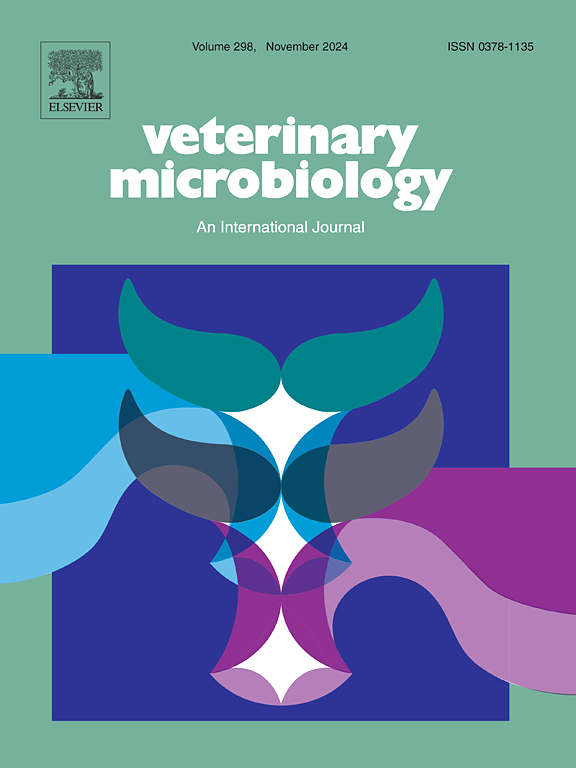Surface expression of PEDV nucleocapsid protein facilitates NK cell-mediated ADCC via anti-N nonneutralizing antibody
IF 2.4
2区 农林科学
Q3 MICROBIOLOGY
引用次数: 0
Abstract
The nucleocapsid (N) protein is the most abundant viral protein during porcine epidemic diarrhea virus (PEDV) infection and exhibits strong immunogenicity, prompting the host immune system to produce large quantities of antibodies against it. However, N-specific antibodies are non-neutralizing, as the N protein is typically located inside viral particles. Understanding the roles of N-specific antibodies during PEDV infection is crucial for developing more effective vaccines. In this study, we demonstrated that a significant amount of PEDV-N protein is expressed on the surface of living cells during PEDV infection or transient N expression. Mechanistically, the PEDV-N protein may reach the cell surface via the exosome secretion pathway. Furthermore, anti-N antibodies can bind to the surface N protein and induce antibody-dependent natural killer (NK) cell-mediated cytotoxicity (ADCC), directly killing PEDV-infected cells. Although anti-N antibodies lack neutralizing effects against PEDV infection, they can target the N protein present on the surface of PEDV-infected cells to induce NK cell-mediated ADCC, thus protecting the host from viral infection. Our results indicate that the N protein holds significant potential as a candidate for designing vaccines against porcine enteric viruses.
PEDV核衣壳蛋白的表面表达通过抗n非中和抗体促进NK细胞介导的ADCC
核衣壳蛋白(N)是猪流行性腹泻病毒(PEDV)感染过程中最丰富的病毒蛋白,具有很强的免疫原性,促使宿主免疫系统产生大量的抗体。然而,N特异性抗体是非中和性的,因为N蛋白通常位于病毒颗粒内。了解n特异性抗体在PEDV感染中的作用对于开发更有效的疫苗至关重要。在本研究中,我们证明了在PEDV感染或瞬时N表达期间,活细胞表面有大量的PEDV-N蛋白表达。在机制上,PEDV-N蛋白可能通过外泌体分泌途径到达细胞表面。此外,抗N抗体可以与表面N蛋白结合,诱导抗体依赖的自然杀伤(NK)细胞介导的细胞毒性(ADCC),直接杀死pedv感染的细胞。虽然抗N抗体对PEDV感染缺乏中和作用,但它们可以靶向PEDV感染细胞表面存在的N蛋白,诱导NK细胞介导的ADCC,从而保护宿主免受病毒感染。我们的研究结果表明,作为设计猪肠道病毒疫苗的候选蛋白,N蛋白具有显著的潜力。
本文章由计算机程序翻译,如有差异,请以英文原文为准。
求助全文
约1分钟内获得全文
求助全文
来源期刊

Veterinary microbiology
农林科学-兽医学
CiteScore
5.90
自引率
6.10%
发文量
221
审稿时长
52 days
期刊介绍:
Veterinary Microbiology is concerned with microbial (bacterial, fungal, viral) diseases of domesticated vertebrate animals (livestock, companion animals, fur-bearing animals, game, poultry, fish) that supply food, other useful products or companionship. In addition, Microbial diseases of wild animals living in captivity, or as members of the feral fauna will also be considered if the infections are of interest because of their interrelation with humans (zoonoses) and/or domestic animals. Studies of antimicrobial resistance are also included, provided that the results represent a substantial advance in knowledge. Authors are strongly encouraged to read - prior to submission - the Editorials (''Scope or cope'' and ''Scope or cope II'') published previously in the journal. The Editors reserve the right to suggest submission to another journal for those papers which they feel would be more appropriate for consideration by that journal.
Original research papers of high quality and novelty on aspects of control, host response, molecular biology, pathogenesis, prevention, and treatment of microbial diseases of animals are published. Papers dealing primarily with immunology, epidemiology, molecular biology and antiviral or microbial agents will only be considered if they demonstrate a clear impact on a disease. Papers focusing solely on diagnostic techniques (such as another PCR protocol or ELISA) will not be published - focus should be on a microorganism and not on a particular technique. Papers only reporting microbial sequences, transcriptomics data, or proteomics data will not be considered unless the results represent a substantial advance in knowledge.
Drug trial papers will be considered if they have general application or significance. Papers on the identification of microorganisms will also be considered, but detailed taxonomic studies do not fall within the scope of the journal. Case reports will not be published, unless they have general application or contain novel aspects. Papers of geographically limited interest, which repeat what had been established elsewhere will not be considered. The readership of the journal is global.
 求助内容:
求助内容: 应助结果提醒方式:
应助结果提醒方式:


